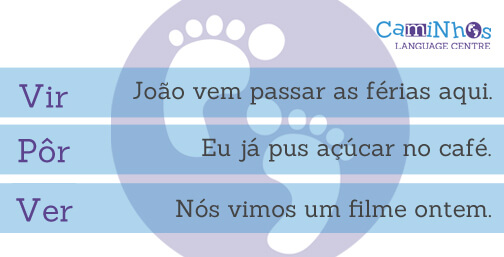Blog
Ver, Pôr and Vir – The most difficult verbs in Portuguese
- Thursday May 28th, 2020
- Posted by: Guest
- Category: Learn the Portuguese Language and Portuguese Grammar

When it comes to grammar, verb tenses are definitely one of the hardest things to learn in Portuguese. It can be challenging, as this beautiful language is very tricky sometimes. Some students have a really hard time learning some of the most difficult verbs in Portuguese. So, let’s talk about them.
When you think you are nailing it with all the conjugations, you bump into a sentence such as “Quando você vir Pedro, me avise.” Unwarned, you might think this is verb Vir (to come). However, in this sentence, “vir” is the future subjunctive form of verb Ver (to see).
Confusing, right?
It gets harder: Verb Ver (to see) is not alone in this. What we are going to study next is two other very hard irregular verbs to learn: Pôr (to put) and Vir (to come).
Let’s try to get this confusion out of your head once and for all.
Table of Contents
ToggleThe three hardest verbs to conjugate in Portuguese – Most difficult verbs in Portuguese
Conjugation of verb Ver
Present tense – Presente do Indicativo
eu vejo
ele/ela/você vê
nós vemos
eles/elas/vocês veem
Example: Nós vemos o nascer do sol sempre que possível.
Past tense – Pretérito Perfeito do Indicativo
eu vi
ele/ela/você viu
nós vimos
eles/elas/vocês viram
Example: Nós vimos uma árvore muito bonita ontem.
Future Subjunctive – Futuro do Subjuntivo
quando/se eu vir
quando/se ele/ela/você vir
quando/se nós virmos
quando/se eles/elas/vocês virem
Example: Se eu vir Maria, aviso que você está procurando por ela.
Conjugation of verb Pôr
Present tense – Presente do Indicativo
eu ponho
ele/ela/você põe
nós pomos
eles/elas/vocês põem
Example: Eu ponho açúcar no café.
Past tense – Pretérito Perfeito do Indicativo
eu pus
ele/ela/você pôs
nós pusemos
eles/elas/vocês puseram
Example: Eu já pus açúcar no café.
Future Subjunctive – Futuro do Subjuntivo
quando/se eu puser
quando/se ele/ela/você puser
quando/se nós pusermos
quando/se eles/elas/vocês puserem
Example: Quando Juliana puser o vertido, ficará linda.
Conjugation of verb Vir
Present tense – Presente do Indicativo
eu venho
ele/ela/você vem
nós vimos
eles/elas/vocês vêm
Example: Os cachorros vêm muito rápido quando chamamos.
Past tense – Pretérito Perfeito do Indicativo
eu vim
ele/ela/você veio
nós viemos
eles/elas/vocês vieram
Example: Eles vieram muito rápido.
Future Subjunctive – Futuro do Subjuntivo
quando/se eu vier
quando/se ele/ela/você vier
quando nós viermos
quando eles/elas/vocês vierem
Example: Se você vier na festa amanhã, por favor traga uma bebida.
Other verbs with the same conjugation
Now for some good news: there are a few other verbs with the same conjugation of these three verbs. So, when you memorize their correct form, you are also memorizing a few more others.
Let’s check those verbs:
Prever (to predict)
Rever (to review)
Supor (to assume)
Expor (to expose)
Propor (to propose)
Repor (to restore)
Intervir (to step in)
Convir (to suit)
Examples:
Ele prevê o futuro nas cartas.
Nós revimos todo o material antes da apresentação, por isso repusemos os orçamentos iniciais.
Os professores supuseram que os estudantes tinham estudado para o exame.
Os artistas expuseram as obras que o museu propôs.
Meu irmão me propôs que morássemos juntos.
Eu e Felipe repomos os materiais no estoque sempre que precismos.
Eu intervenho em brigas quando acho necessário.
Paulo concorda com tudo que lhe convêm.
Exercise
Now it is your turn. Fill in the blanks below with the correct conjugation using verbs Ver, Pôr and Vir.
- Quando vocês _________ aqui em casa?
- Ele _________ uma reforma na casa.
- Quando era criança sempre _________ o melhor das pessoas.
- Se você _________ meu celular, me avisa.
- Quando você _________ sua opinião, ele vai entender.
- Eu já _________ todo o material do estoque.
- Os cientistas _________ que o vírus se espalharia em duas semanas.
- Essa proposta não me _________.
- Assim que _________ os verbos, vamos falar melhor.
- Os políticos _________ nas decisões dos médicos.
Answers
1. vêm; 2. propôs; 3. supunha; 4. vir; 5. expuser; 6. repus; 7. previram; 8. convém; 9. revir; 10. intervieram
Conclusion
As you can see, learning the most difficult verbs in Portuguese is not as hard as you might have thought first. And if you got a few of them wrong, don’t worry It is very common for native speakers to make mistakes when using these verbs as well.
If you need any help practicing verbs in Portuguese, book your online Portuguese classes with Caminhos and one of our professional teachers will be glad to guide you through it.
Caminhos Language Centre is the largest and most exciting Portuguese school in Rio de Janeiro, Brazil. We have an excellent infrastructure, over 15 experienced Brazilian teachers, and a friendly multilingual support staff. We are the only school in Brazil able to offer Portuguese group courses throughout the year on 10 different levels. Moreover, our school also offers more than just Portuguese lessons for foreigners, we offer you the complete Rio de Janeiro experience. Every day we organize 100% free and fun activities for you to socialize and practice your Portuguese. We can also help you with a student visa for Brazil and accommodation in Rio de Janeiro. Follow us on Instagram for some Portuguese tips and news.


 Deutsch
Deutsch Français
Français Português
Português Español
Español



Boa tarde, gostei do site!